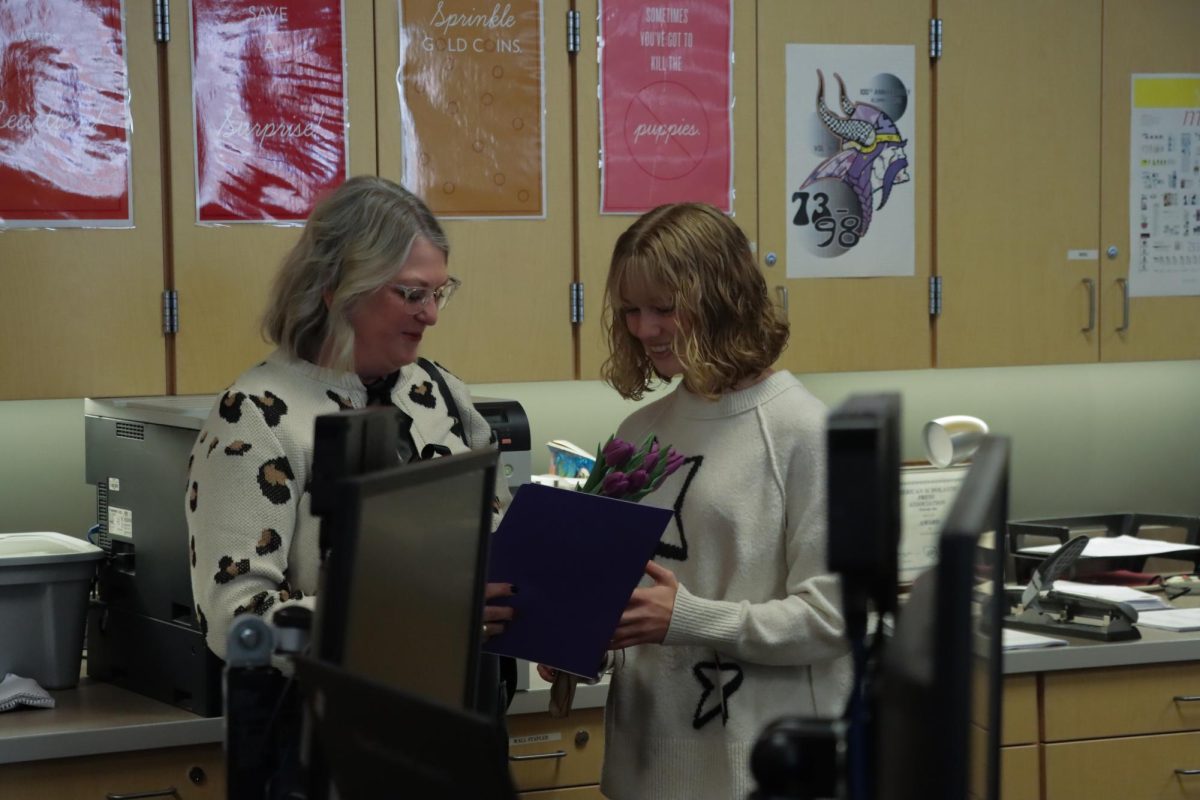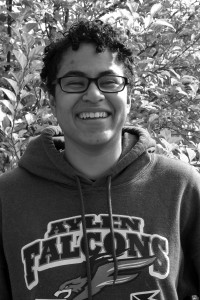Q: Can you share your past experience as a teacher in the district, anything important you would want students to know about you?
A: I have been teaching in the district as a paid teacher for six years but I worked as a volunteer for ten years. I raised my children and then I went back to school when they were in junior high.
I have an interesting background. I started in English and then I fell into art because I had my own business, did graphic design and public relations for small companies. And often times in small companies you have the opportunity to do a little of both because you’re not just writing, you’re also responsible for some of the art pieces. So with public relations in nonprofits that’s especially true because there’s not a lot of money. I fell into that, so I was writing public relations pieces.
When I got my degree, I said I would never be a teacher. People always ask you when you get an English degree-“Are you going to be a teacher?” I said, “No, I’m never going to be a teacher. That’s not what I want to do.” But as life goes on you change and you start looking at your life differently and your life experiences kind of inform that.
The most important things I can teach kids are to think deeply and to ask the right questions. And I think that is more important than anything. It is more important than the subject matter and more important than all the rules and regulations we have in school. If we can ask them to think deeply and ask the right questions they will be able to make sense of the world and they’re going to be able to do some amazing things.
Q: Is that something you learned in school or as a teacher?
A: I had some amazing teachers but I think most of the things I have learned that have made an impact on my life I have learned within the last 15 years. Raising children certainly helps your think about things differently and being open minded. I have lived all over the world because my dad was in the Air Force and just being able to talk to different people, see their point of view, which can be completely different from yours but just as valid when you look at their experience and where they live and what their work is like and how hard it is for some of these people to put food on the table. You really think about these things differently because the lens through which you look at things, your perspective, can completely change when you can experience those things. And that is why I think travel is one of the most important things you can do because it really informs you and helps you to think about, not just something but understand the essence of something. It is the difference between reading a book about an apple and eating an apple. That is why when people write the most important writing they do is the writing that is relevant to them. It means their experience is directly relational to what comes out of that. If they have a lot of experience with something they are going to be very passionate about something. And I don’t care what you do; if you’re not passionate about it, you shouldn’t be doing it.
Q: Which places have you traveled that were the most impacting to you?
A: I think Asia is intensely interesting. Their values are a little bit different than ours. I spent about a month in Japan a couple of years ago. My husband is half Japanese and my mother-in-law is full. I do not like cruise ships or canned travel; I really believe you need to get into the restaurants, the bars, the grocery stores, the places where everyday people go, to understand a culture. I do not think the canned approach is really going to be anything more than the highlights. It is like reading the table of contents for a book. You are not really getting into the meat of the matter. My mother in law was a master kanji writer. She did old style and so the kind of kanji she wrote was actually was not used expect in museums and older places of worship and it was not a general kanji that even the general population understood. She explained to me the origin of the word, of that particular character, how it came to be, why it was important in their culture. Like the kanji for rice is amazing. It is the root for so many different words in their culture because rice is very important and the symbolism behind rice is very important. Understanding those little foundational pieces of their philosophy and culture-you can’t get that from a travel book or from going to see a shrine. You need to talk to the people.
Q: What brought you to PHS?
A: I actually subbed in the district for many years and I came back to the schools I really, really liked. I love PHS. What is funny about that is I’m a house divided, across the street from Rogers, if you can believe that. But I love Rogers because my kids went there but I was really happy with the administration here. The way the district runs it is a top-down, not a bottom-up organization. If the leaders and administration of a school are doing a good job, you are going to have longevity in the staff. And a lot of our staff have been here 25, 30 years- a long time because it’s a family environment. They take care of their own. Even though there are problems in any large organization, they do a good job of making kids feel welcome. They care about kids. That is the main thing. You get good stuff [in the administration] and it trickles down to the staff and the students. And you go back where that is working. That is why I kept coming back here. These guys are really interested in the whole person, not just how they’re doing in school but all the pieces that make you a good learner are also going to make you a good person.
Q: What are you most looking forward to about being part of PHS?
A: Getting to know people more. That is the hard thing about being a substitute. You do not get to put down roots anywhere and I like being a part of this organization and I am excited to get to know more students and more staff. I think that makes you a better teacher. I teach three sections of junior English and two sections of sophomore pre-AP English.
Q: Is there anything else you’d like to share or that you want students to know about you?
A: I am always available after school for help if they need me. They just need to let me know.


